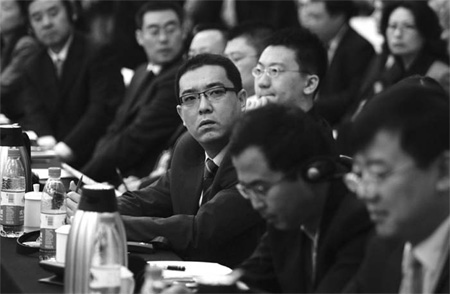Expo Special: Forum highlighting sustainable growth
|
Attentive participants at the Mayors Forum. Photos by Feng Yongbin / China Daily |
Mayors of cities in Central China had a rare chance to listen to foreign experts' suggestions on how to achieve a sustainable, efficient and eco-friendly development - not on the foreign soil but at a forum in the inland city of Taiyuan on Sept 27.
A part of the Expo Central China 2011, the Mayors Forum on Sustainable Development gathered government officials, experts of international organizations and executives of multinational companies, to share insights on the transformation of industrial structure in the Central China region.
"There are not so many places you want to put your money in at the moment, and China is definitely one of the places, as it always was in the last decade, where you will probably have the safest investment returns," said Joost Geginat, senior partner of the Southeast Asia branch of the consulting company Roland Berger, in a keynote speech.
But he noted that the traditional economic model "which have made China so successful will not necessarily be the model which will bring China into the future".
The opportunity for the Central China region "is not in low-cost labor or in low-cost manufacturing", he explained. "The opportunity is in upgrading the infrastructure."
He also said the central provinces "deserve increasing attention from multinational companies", as the region is "a very attractive market".
Xue Yunwei, vice-mayor of Zhengzhou, Henan province, said he believes that the central region will rise in the next 30 years, as the Yangtze River Delta and Pearl River Delta regions did three decades ago, because of the shift of industries from the east.
He also believes that a number of emerging cities in the central region will become important hubs like Shanghai and Shenzhen.
Lord Clement Jones, vice-chairman of the British parliament's Cross-Party Team for China Affairs, warned that "even in central China, the major cities are not going to all succeed in exactly the same way". He suggested diversified development models, as each city has different strengths and weaknesses.
"They need to have their own specialities. They need to develop their own particular value-added industries which may not be the same," he said.
Jones gave advice for future development with the metaphor of dance.
"It takes two to tango," he said.
"Development needs a partnership between different elements - private and public, city and provincial governments, Western companies and Chinese companies, universities and business," he explained. "It can't be a one-side relationship, and each side must contribute."
(China Daily 09/28/2011 page16)















